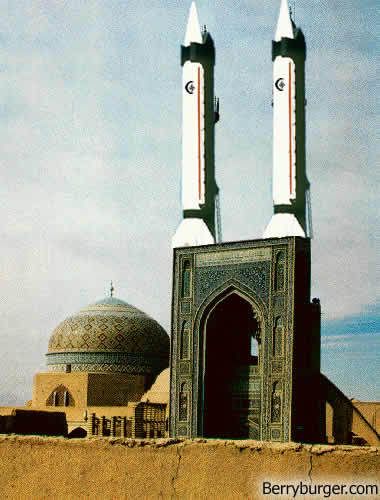Iran Nuclear Scenarios Call For Tough Talks
 Caroline Glick, the brilliant and aggressive columnist for the Jerusalem Post, lays out three scenarios for what would happen if Iran becomes a nuclear power. Here is the most optimistic of the three:
Caroline Glick, the brilliant and aggressive columnist for the Jerusalem Post, lays out three scenarios for what would happen if Iran becomes a nuclear power. Here is the most optimistic of the three:In the most optimistic scenario, Iran would not attack Israel or any other country with its atomic arsenal, but would rather use it as an instrument of international and regional influence. In this scenario, Iran would reap economic advantage from its nuclear status by threatening oil shipping in the Persian Gulf and so jack up worldwide oil and gas prices. A massive economic dislocation in the oil consuming countries would no doubt ensue. In this state of affairs, all international economic sanctions against Iran would disappear and states would begin fighting with one another for the right to develop Iran's oil and gas fields and refining capabilities.And it goes downhill from there, ending basically with the global spread of radical Shi'ite jihad and sharia, and the destruction of America.Operating under Iran's nuclear umbrella, terror groups like Hizbullah and Al-Qaida would feel free to attack at will throughout the world. The rates of terrorism - of both the organized and lone wolf variety - would increase exponentially.
Regionally, Iran would work to export its Khomeinist Shi'ite revolution. It would increase its interference in both Iraq and Afghanistan and so neutralize and defeat coalition and NATO efforts to stabilize those countries.
As to Saudi Arabia, there can be little doubt that Iran would seek to foment an uprising of Saudi Shi'ites who happen to live as a repressed minority on top of the Saudi oil fields.
Hizbullah's aim to overthrow the Saniora government in Lebanon would receive unprecedented Iranian assistance that would likely lead to the Shi'ite takeover of the country. So too, under the Iranian nuclear umbrella, Palestinian terrorism against Israel, and Syrian adventurism against Israel would rise steeply. The regimes in Egypt and Jordan as well as Saudi Arabia would be sunk into chaos, insurgency and war as they themselves entered a nuclear arms race the likes of which the world has never seen.
From this, Glick concludes that the Bush Administration was wrong to "reconsider its decision to abandon the Bush Doctrine, [which] eschewed appeasement of terror-supporting, weapons of mass destruction-proliferating enemies of the free world." She worries that the initiation of low-level, informal talks with Tehran will necessarily lead to appeasement, and that there is no room for a appeasement with Tehran.
I agree about appeasement, but not about talks being a mistake. There is also this diplomatic scenario: We communicate with Iran that the only gift we will give them if they stop their nuclear program is their continued existence. It's "speak tough and carry a big stick" diplomacy, and we need to start it now.
In North Korea, the Bush Doctrine is intact (for now, at least) because the grounds of the agreement give L'il Kim Jong Il nothing until he concedes. Concede/get, concede/get. L'il Kim is isolated, remote and broke, so this can work, with proper toughness and oversight.
Iran is a different story. It's central on the world stage, it's resource-rich and it's actively involved in actions against the U.S. I think this has made the Bush administration understand that the Doctrine doesn't say "don't talk," it says "don't negotiate," and that now is the time to talk, and talk tough, to Tehran.
Read Glick's three options and see if you don't agree. If we are going down a road that could lead to a massive strike on Iran, we need to be talking to them now to let them see the clarity of our resolve and the options available to them other than being on the losing end of a conflict with America.
Hat-tip: Real Clear Politics. Art: BerryBurger
Labels: Bush, Bush Doctrine, Iran, Islamist, War on Terror




<< Home